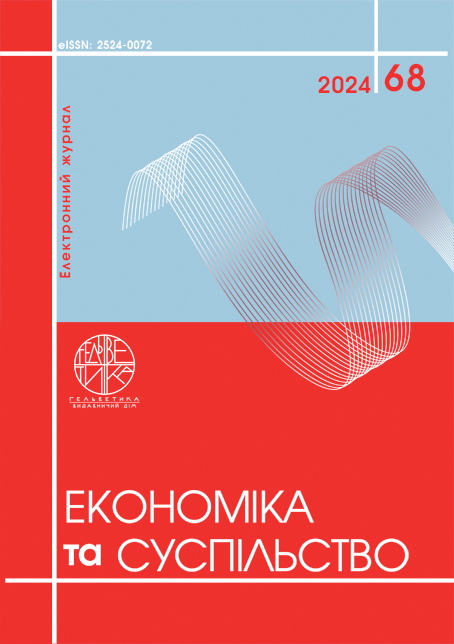POSTCOLONIAL INTERNATIONAL TRADE AS A TRIGGER OF INEQUALITY AND UNDERMINING OF GLOBAL SECURITY
Abstract
The article shows the impact of postcolonial practices of international trade on economic inequality, which in recent years has reached impressive proportions not only in former colonies, but also in developed Western countries, in particular the USA, becoming a trigger for the undermining of global security. There is an increase in subsidies, increased export controls and the introduction of investment restrictions due to the digital, debt and payment fragmentation of the countries of the world, which in turn deepens inequality, especially in former colonies. The colonial past continues to influence modern economic structures, contributing to inequalities between metropolises, former colonies and developing countries. These inequalities are manifested through unfair trade agreements, financial and economic asymmetries, as well as structural restrictions that negatively affect the industrial development of less developed countries, deepening inequality and preserving poverty. The G20 countries cannot demonstrate global leadership in trade openness according to the International Chamber of Commerce (ICC) Open Markets Index, but instead demand it from the least developed countries, which in many cases does not lead to job creation and economic growth. These policies consolidate the appropriate division of labor and contribute to the exploitation of natural and human resources in developing countries. Both phenomena - trade wars and economic selfishness contribute to the "fragility" of the geopolitical space. The use of the main ideas of postcolonial analysis allowed us to critically reflect on the consequences of international trade liberalization for the security of developing countries and global security in general. The relevance of these studies intensified during the Russian-Ukrainian war, which most researchers call the first colonial war of the 21st century. It is proposed that international organizations, in particular the WTO, monitor trade agreements to prevent asymmetric unilateral benefits for developed countries, which leads to a deepening of inequality.
References
2023 Trade report. A fragmenting world URL: https://iccmex.mx/comision/posturas-herramientas/2023-icc-trade-report-a-fragmenting-world.pdf
Фанон Ф. Гнані і голодні. пер. з фр. К.: Вперед, LAT & K. 2016. 227 с. URL: https://hromadalib.wordpress.com/wp-content/uploads/2019/02/fanon_1961_damnes-1.pdf
Райнерт Е. С. Як багаті країни стали багатими…І чому бідні країни залишаються бідними. Переклад з англ. Я.Сінайко за наук. ред. В.Галасюка. К.: Саміт-Книга. 2019. 416с.
Global poverty and climate goals will remain out of reach with business-as-usual policies. 24.06.2024. URL: https://blogs.worldbank.org/en/opendata/global-poverty-and-climate-goals-will-remain-out-of-reach-with-b
Прінс Т.(Prince Todd) До західних славістів починає «доходити». Є шанс, що історію росії почнуть вивчати через призму колоніалізму. URL: https://texty.org.ua/articles/108628/rosiyi-prydylyaly-zabahato-uvahy-yak-vijna-zminyuye-pidhody-naukovciv-do-shidnoyevropejskyh-ta-yevrazijskyh-studij/?src=read_next_banner&from=109421
Заремба К. Чому Україна слабка держава? Чому нам так важко? Ми долаємо наслідки колоніалізму. URL: https://texty.org.ua/articles/58802/Chomu_Ukrajina_slabka_derzhava_chomu_nam_tak-58802/?src=read_next_banner&from=109421
Рябчук М. Біла шкіра, чорна мова. URL: https://universum.lviv.ua/data/magarticles/files/2860.pdf
Атанесян Г. Як Росія колонізувала інші народи та чому вона це заперечує зараз. URL: https://www.bbc.com/ukrainian/features-62409319
Толстов С. Розділ ІІІ. Актуальні проблеми дослідження історичної пам’яті. С Концепція державного становлення та розвитку США в контексті політико-ідеологічних суперечностей.172-194. URL: https://elibrary.ivinas.gov.ua/4893/1/Kontseptsiia%20derzhavnoho%20stanovlennia%20ta.pdf
Gray C. War, Peace and International Relations. An introduction to strategic history. 2011. 2nd Edition. London. Routledge.392p. URL: https://doi.org/10.4324/9780203180952
Rao, N. “Neocolonialism” or “Globalization”? Postcolonial Theory and the Demands of Political Economy. Interdisciplinary Literary Studies, 1(2), 165–184. http://www.jstor.org/stable/41209050 ring 2000), pp. 165-184 URL: http://www.jstor.org/stable/41209050.
Edwards Z. Postcolonial sociology as a remedy for global diffusion theory. URL: https://doi.org/10.1177/0038026120916132
Adanhounme, A. B. Corporate social responsibility in postcolonial Africa: Another Civilizing Mission? Journal of Change Management, 11(1), 91-11 URL: https://www.tandfonline.com/doi/abs/10.1080/14697017.2011.548945
Cirrincione E. Huawei internationalization strategy in Africa: a case of Chinese “colonialism”? URL: https://www.china-files.com/wp-content/uploads/2022/09/MA-THESIS-ELISA-CIRRINCIONE.pdf
Lindstén J. From Colonial Past to Colonial Future? A Case Study of the Belt and Road Initiative in Kazakhstan. URL: https://mau.diva-portal.org/smash/get/diva2:1818949/FULLTEXT02.pdf
Eurostat. Investment Data. URL: https://ec.europa.eu/eurostat
Сірук Н. У колишніх радянських країнах бідність зростає. Світовий банк як ліки прописує «громадянське» суспільство. День. 21 вересня 2000 року. URL: https://m.day.kyiv.ua/article/den-planety/u-kolyshnikh-radyanskykh-krayinakh-bidnist-zrostaye
Тимошенко В.І. Несправедливість і бідність як загроза національній безпеці України. Науковий вісник Ужгородського Національного Університету. Серія ПРАВО. Випуск 82: частина 1. 2024.С 135-140. URL: https://visnyk-juris-uzhnu.com/wp-content/uploads/2024/05/21.pdf
2023 Trade Report: A Fragmenting World. URL: https://iccmex.mx/comision/posturas-herramientas/2023-icc-trade-report-a-fragmenting-world.pdf
Fanon, F. The Wretched of the Earth. Kyiv: Vpered, LAT & K, 2016. 227 p. URL: https://hromadalib.wordpress.com/wp-content/uploads/2019/02/fanon_1961_damnes-1.pdf
Reinert, E. S. How Rich Countries Got Rich ... and Why Poor Countries Stay Poor. Kyiv: Summit-Knyha, 2019. 416 p.
Global Poverty and Climate Goals Will Remain Out of Reach with Business-as-Usual Policies. World Bank, 2024. URL: https://blogs.worldbank.org/en/opendata/global-poverty-and-climate-goals-will-remain-out-of-reach-with-b
Prince, T. Western Slavists Start to "Get It": How the War Changes Approaches to Eastern European and Eurasian Studies. URL: https://texty.org.ua/articles/108628/rosiyi-prydylyaly-zabahato-uvahy-yak-vijna-zminyuye-pidhody-naukovciv-do-shidnoyevropejskyh-ta-yevrazijskyh-studij/
Zaremba, K. Why Ukraine Is a Weak State? Overcoming Colonial Legacy. URL: https://texty.org.ua/articles/58802/Chomu_Ukrajina_slabka_derzhava_chomu_nam_tak-58802/
Ryabchuk, M. White Skin, Black Tongue. URL: https://universum.lviv.ua/data/magarticles/files/2860.pdf
Atanesyan, G. How Russia Colonized Other Peoples and Why It Denies This Now. BBC Ukrainian. URL: https://www.bbc.com/ukrainian/features-62409319
Tolstov, S. Chapter III. Current Problems in the Study of Historical Memory. URL: https://elibrary.ivinas.gov.ua/4893/1/Kontseptsiia%20derzhavnoho%20stanovlennia%20ta.pdf
Gray, C. War, Peace and International Relations: An Introduction to Strategic History. 2nd Edition. London: Routledge, 2011. 392 p. URL: https://doi.org/10.4324/9780203180952
Rao, N. "Neocolonialism or Globalization? Postcolonial Theory and the Demands of Political Economy." Interdisciplinary Literary Studies, 1(2), 165–184. URL: http://www.jstor.org/stable/41209050
Edwards, Z. Postcolonial Sociology as a Remedy for Global Diffusion Theory. URL: https://doi.org/10.1177/0038026120916132
Adanhounme, A. B. "Corporate Social Responsibility in Postcolonial Africa: Another Civilizing Mission?" Journal of Change Management, 11(1), 91-111. URL: https://www.tandfonline.com/doi/abs/10.1080/14697017.2011.548945
Cirrincione, E. Huawei Internationalization Strategy in Africa: A Case of Chinese "Colonialism"? URL: https://www.china-files.com/wp-content/uploads/2022/09/MA-THESIS-ELISA-CIRRINCIONE.pdf
Lindstén, J. From Colonial Past to Colonial Future? A Case Study of the Belt and Road Initiative in Kazakhstan. URL: https://mau.diva-portal.org/smash/get/diva2:1818949/FULLTEXT02.pdf
Eurostat. Investment Data. URL: https://ec.europa.eu/eurostat
Siruk, N. In Former Soviet Countries, Poverty is Rising: The World Bank Prescribes "Civil Society" as Medicine. Den, 2000. URL: https://m.day.kyiv.ua/article/den-planety/u-kolyshnikh-radyanskykh-krayinakh-bidnist-zrostaye
Tymoshenko, V. I. Injustice and Poverty as a Threat to Ukraine’s National Security. Scientific Bulletin of Uzhhorod National University. Series Law, Issue 82, Part 1, 2024, pp. 135–140. URL: https://visnyk-juris-uzhnu.com/wp-content/uploads/2024/05/21.pdf

This work is licensed under a Creative Commons Attribution 4.0 International License.


